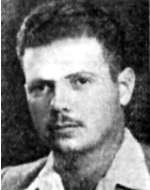Efrat, Avihu
Son of Frida and Aryeh, was born on 29.1.1922 in Zichron Yaakov. When he was three, his parents moved to Degania Bet. Two years later he accompanied his parents on a mission to America. When they returned about a year later, they sat briefly in Haifa and then moved to Kiryat Haim. Avihu graduated from the Reali School in Haifa and later studied at the vocational school of the Hebrew Technion in Haifa. He was a member of the Haganah from the age of 14. He was active as a teacher in Kiryat Haim and in the Gulf and was a instructor in signaling courses. After a year of service in Notarot, he worked at the Ramallah radio station. In 1941 he enlisted in the British Army, served as a member and was transferred to the camouflage company of the Eighth camp. His request to join as a paratrooper was rejected because of his Jewishness. He wrote about his volunteering for the army in one of his letters to the family: “When people are required and they do not, they have to take their place in their place, do not they?” He arrived in Italy with the British Army, worked in the Jewish refugee camps, where he learned of his father’s death. In 1946 he was discharged from the army and worked at the Water Institute in Kiryat Haim. After about a year, he joined the Haganah for full service in the Carmeli Brigade. He participated in the bombing of the bus depot in Haifa, in the punitive action against the Arab villages of Balad a-Sheikh and Tamra (near Acco) and was appointed as one of those responsible for security at the Haifa port. Avihu completed a naval training course and was strongly refused to return to his regiment, taking part in the liberation of the Western Galilee, the conquest of Akko, Kabri and a-Zib, and his company breaking the enemy lines into besieged Yehiam. After occupying the Gilboa ridge, on the night of June 2-3, the Carmeli Brigade attacked Jenin and occupied the outposts that control the city.The Iraqi army, which moved to Samaria after its failure in the Jordan Valley, concentrated its forces and attacked it. In this battle Avihu fell on the 3rd of Iyar 5708 (June 3, 1948), after he was left to cover up the retreat. On August 3, 1950, he was put to rest at the military cemetery on Mount Herzl in Jerusalem.
